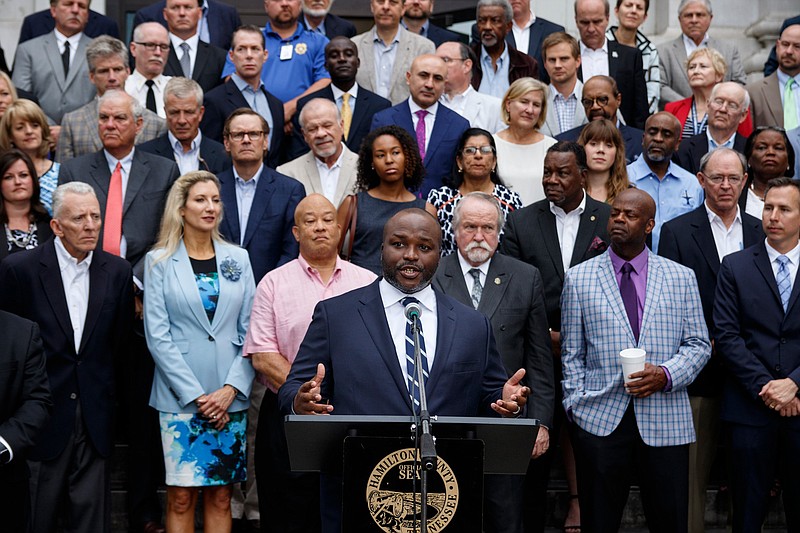Imagine Hamilton County commissioners who deign to vote their constituents' desires. Five who did Thursday were in the majority in - effectively - voting down a 34-cent property tax increase for county residents that would have benefited district schools.
They did so in spite of a united group of pro-tax business, civic, advocacy and philanthropic organizations, phone banks pushing the increase and a well-funded direct mail campaign.
In doing so, though, they left unapproved a fiscal 2020 Hamilton County budget, which must be finalized by Aug. 31. A continuation budget from fiscal 2019 will serve the county in the interim.
In the meantime, the Hamilton County Board of Education will have to craft a new budget. Board members can try again with the budget commissioners rejected, submit one that is balanced but includes an estimated $9 million in growth money or one that pares back district requests and asks commissioners for a smaller tax increase.
Although timing is everything, we hope the period of slightly more than two months will include sessions in which commissioners and school board members consider the future together, can study the pending school facilities report that is likely to suggest the closing or consolidation of some schools and building of others, and will be able to celebrate - and thus tell constituents - how much improvement Hamilton County students made this year on standardized tests.
With all that information, both commissioners and their constituents will have a broader picture of district needs going forward. Given that, they can feel more comfortable about voting for no increase, a smaller tax increase or waiting a year to again suggest a larger tax increase.
Although the lobbying for a tax increase ramped up through Tuesday with paid mailers and telephone calls, the belief from public statements and insider comments over the last week was that defeat was a foregone conclusion. Commissioners Chester Bankston, Sabrena Smedley and Tim Boyd had said publicly they planned to vote against the tax increase, and Commissioners Randy Fairbanks and Greg Martin also were thought to be "no's". One commissioner said mail had been running 80%-plus against the tax increase.
Commissioners Robert Sharpe, Warren Mackey and Katherlyn Geter were thought to be solid "yes" votes for an increase.
That allowed Commissioner Chip Baker, a Signal Mountain resident whose town is considering a 22% property tax increase, to vote for the tax. Saying he was a conservative and terming his constituents "mixed" on the tax increase, he nevertheless said "now is the time when everyone is aligned. The time [to vote for an increase] is now."
The actual vote came in the form of an amendment to the budget resolution offered by Bankston. He suggested the budget be adopted without the 34-cent tax increase, essentially scissoring out the additional money for education.
When the vote eventually came, adopting the resolution meant voting "yes," and defeating the resolution - preferring the budget with the increase - meant voting "no."
Since no tax increase was implemented during the meeting, commissioners also voted down 5-3 a resolution that would have requested the Tennessee General Assembly increase to $40,000 the maximum household income allowed for senior citizens, disabled veterans and widows of disabled veterans to be eligible for a state tax relief program. They had adopted a resolution last week authorizing Hamilton County to match at 100% the state contributions available through the Tennessee Tax Relief program if commissioners had voted Wednesday to raise property taxes.
Before the budget resolution amendment vote and after, several commissioners talked about working together toward what might assumed to be a compromise budget. Several commissioners who voted against the tax hike, in fact, talked about the need to pay teachers better and about the realities the school facilities report might bring.
Whether five can be marshaled to vote for a smaller tax increase is not clear, but tax proponents only need one vote, assuming the same four who voted for one Wednesday would vote for a smaller one sometime in the next two months.
Either way, we're optimistic school board members, commissioners and the public should have a clearer picture of the playing field before a final budget is drawn up. Going into the vote, that had been our hope - that although school district officials had made their case for more money, either a smaller increase be voted on this year or that commissioners wait until next year when test scores and the facilities report could provide more clarity.
Now we'll see what that window of time allows.
